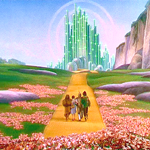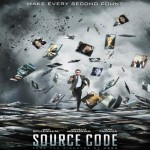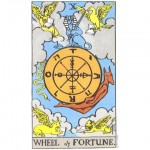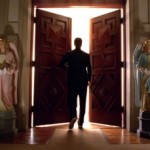 If you’ve ever wondered why we are here, this article is for you. If you’ve never wondered, some part of you has been wondering without your knowledge or else you wouldn’t be reading this now. There’s been a lot written about what life is and what we’re doing here. Some of it is very technical and philosophical. Some of it is very metaphorical and poetic. And then there is the actual answer, which we may never know. However, one truth I’ve noticed about this world is that cycles exist within cycles within cycles. Electrons swirling around a neutron are similar to our planets swirling around the sun. The shape of a leaf is indicative of the shape of the tree it came from. History repeats itself. Myths evolve over time but their basic elements all remain the same. Putting these truths together I was able to trace back to the origins of the first story and, to my shock and awe, uncovered an answer to a question I’ve been wondering for a very long time: why did the universe evolve to become so seemingly complicated? The answer, ironically enough, is incredibly simple.
If you’ve ever wondered why we are here, this article is for you. If you’ve never wondered, some part of you has been wondering without your knowledge or else you wouldn’t be reading this now. There’s been a lot written about what life is and what we’re doing here. Some of it is very technical and philosophical. Some of it is very metaphorical and poetic. And then there is the actual answer, which we may never know. However, one truth I’ve noticed about this world is that cycles exist within cycles within cycles. Electrons swirling around a neutron are similar to our planets swirling around the sun. The shape of a leaf is indicative of the shape of the tree it came from. History repeats itself. Myths evolve over time but their basic elements all remain the same. Putting these truths together I was able to trace back to the origins of the first story and, to my shock and awe, uncovered an answer to a question I’ve been wondering for a very long time: why did the universe evolve to become so seemingly complicated? The answer, ironically enough, is incredibly simple.
 In a New York Press article from August, 2011, film producer and director Tommy Pallotta, said, “I am a fan of audience participation, but I also think audiences like to be told a story. There’s this thing video game designers call a ‘golden path’—there’s a definite way that the majority of people are going to experience the game, and the designers plot that. A lot of the interactivity in a video game is really just the illusion of interactivity. It’s about engaging the audience and giving at least the feeling of volition. But as the artist you have the sense that you are, in some way, controlling it, blending the craft of storytelling with the illusion of agency.” In other words, in a game you think you are controlling the action, but really it’s already been pre-programmed. Kind of like what we think of as destiny. In fact, maybe that’s exactly what destiny is: the path we are meant to take in order to have the most fulfilling experience.
In a New York Press article from August, 2011, film producer and director Tommy Pallotta, said, “I am a fan of audience participation, but I also think audiences like to be told a story. There’s this thing video game designers call a ‘golden path’—there’s a definite way that the majority of people are going to experience the game, and the designers plot that. A lot of the interactivity in a video game is really just the illusion of interactivity. It’s about engaging the audience and giving at least the feeling of volition. But as the artist you have the sense that you are, in some way, controlling it, blending the craft of storytelling with the illusion of agency.” In other words, in a game you think you are controlling the action, but really it’s already been pre-programmed. Kind of like what we think of as destiny. In fact, maybe that’s exactly what destiny is: the path we are meant to take in order to have the most fulfilling experience.
 We are living through some pretty dark times. The economy continues to be horrendous with the middle class going through the toughest challenges it’s ever had to face. To make matters worse, natural disasters are becoming more powerful and frequent than ever before, the uprisings in the Middle East are bringing unprecedented instability to the region, and if these “end of days” scenarios weren’t enough, the Maya, Nostradamus, and others all actually predicted the end of the world in 2012. It’s not like this is anything you haven’t heard on the media or from others dozens of times before. The funny thing? None of it’s true. Lately, we’ve been hearing and accepting dozens of statistics like these without question. It’s a sinfully delicious dessert the entire world seems to be stuffing themselves with: the chocolate cake of negativity.
We are living through some pretty dark times. The economy continues to be horrendous with the middle class going through the toughest challenges it’s ever had to face. To make matters worse, natural disasters are becoming more powerful and frequent than ever before, the uprisings in the Middle East are bringing unprecedented instability to the region, and if these “end of days” scenarios weren’t enough, the Maya, Nostradamus, and others all actually predicted the end of the world in 2012. It’s not like this is anything you haven’t heard on the media or from others dozens of times before. The funny thing? None of it’s true. Lately, we’ve been hearing and accepting dozens of statistics like these without question. It’s a sinfully delicious dessert the entire world seems to be stuffing themselves with: the chocolate cake of negativity.
 As mentioned in last quarter’s column, there have been a lot of “life-as-illusion” themed movies coming out lately. While I suspect that the success of Avatar and Lost are partly responsible for this trend, I think people’s fascination with 2012, drastic world changes, and a surge in our search for meaning are also fueling the recent string of films about alternate realities and simulated worlds. When airplanes are crashing into buildings, cities are submerged underwater, the Middle East is revolting, and the world economy is collapsing, real life almost seems more fantastical than our dreams. Jon Stewart summed it up perfectly at the 2008 Academy Awards: “Normally, when you see a black man or a woman president, an asteroid is about to hit the Statue of Liberty.” Yes, we are now officially living in the future, and we all know what kind of stuff happens in the future—exactly the kind of stuff that’s happening right now. But at least, thanks to Hollywood, we’ve been warned. And Hollywood’s heads up may even go much deeper than prophesies of events to come. They may help explain the reality we all find ourselves in.
As mentioned in last quarter’s column, there have been a lot of “life-as-illusion” themed movies coming out lately. While I suspect that the success of Avatar and Lost are partly responsible for this trend, I think people’s fascination with 2012, drastic world changes, and a surge in our search for meaning are also fueling the recent string of films about alternate realities and simulated worlds. When airplanes are crashing into buildings, cities are submerged underwater, the Middle East is revolting, and the world economy is collapsing, real life almost seems more fantastical than our dreams. Jon Stewart summed it up perfectly at the 2008 Academy Awards: “Normally, when you see a black man or a woman president, an asteroid is about to hit the Statue of Liberty.” Yes, we are now officially living in the future, and we all know what kind of stuff happens in the future—exactly the kind of stuff that’s happening right now. But at least, thanks to Hollywood, we’ve been warned. And Hollywood’s heads up may even go much deeper than prophesies of events to come. They may help explain the reality we all find ourselves in.
 There have been a lot of “life-as-illusion” themed movies coming out lately. We’ve had Avatar, Inception, and TRON: Legacy, and this month alone there’s The Adjustment Bureau, Limitless, Sucker Punch and Source Code. All these films share themes of alternate realities, questions about what is reality, and insight into powers that might be manipulating the reality we live in. While I hope to discuss the most recent batch of these films in an upcoming column, for now I’d like to bring up one that slipped past the radar of many moviegoers. This film actually gave me goose bumps when it revealed an angle that I’ve only recently adopted, and have never before seen in any other movie. That film is Disney’s Tangled.
There have been a lot of “life-as-illusion” themed movies coming out lately. We’ve had Avatar, Inception, and TRON: Legacy, and this month alone there’s The Adjustment Bureau, Limitless, Sucker Punch and Source Code. All these films share themes of alternate realities, questions about what is reality, and insight into powers that might be manipulating the reality we live in. While I hope to discuss the most recent batch of these films in an upcoming column, for now I’d like to bring up one that slipped past the radar of many moviegoers. This film actually gave me goose bumps when it revealed an angle that I’ve only recently adopted, and have never before seen in any other movie. That film is Disney’s Tangled.
 In anticipation of TRON: Legacy, I recently re-watched a bunch of simulation-world films including The Thirteenth Floor, eXistenZ, and the original TRON, which I hadn’t seen in over twenty-five years. While I remember being somewhat confused watching the futuristic Disney film as a kid, seeing it again with new eyes, I was amazed at how clearly it expressed the “life as illusion” theme I’ve been so fascinated by as an adult. In the original movie, Jeff Bridges is considered a “user.” While Bridges often plays users in his films, in this case, it refers to a computer user who manipulates the scenarios of a digital world that is very similar to our own. In the original film, users are considered mythical, messianic figures who can help free the programs from the game they find themselves in. This got me thinking.
In anticipation of TRON: Legacy, I recently re-watched a bunch of simulation-world films including The Thirteenth Floor, eXistenZ, and the original TRON, which I hadn’t seen in over twenty-five years. While I remember being somewhat confused watching the futuristic Disney film as a kid, seeing it again with new eyes, I was amazed at how clearly it expressed the “life as illusion” theme I’ve been so fascinated by as an adult. In the original movie, Jeff Bridges is considered a “user.” While Bridges often plays users in his films, in this case, it refers to a computer user who manipulates the scenarios of a digital world that is very similar to our own. In the original film, users are considered mythical, messianic figures who can help free the programs from the game they find themselves in. This got me thinking.
 Throughout my travels this summer, I kept hearing similar themes coming up again and again: the idea that the world seems to be broken and in need of repair, that the system no longer works, that the rules have drastically changed since we were kids, that there seems to be a gap between where we are and where we want to go, both as a society, and in our individual lives. Admittedly, these themes were most often being repeated by me, but others weren’t giving me the kind of baffled looks I used to get when I spoke my mind. No, most of the time they agreed with me and shared their frustrations about how hard things seem to be these days. Initially, I had no answers. But then, a solution came to me from a most unexpected source—the TV show, Lost. Actually, the source wasn’t the unexpected part since I’d been getting wisdom from Lost for years and had even written a book about it. What was unexpected was that the show had already concluded three months earlier.
Throughout my travels this summer, I kept hearing similar themes coming up again and again: the idea that the world seems to be broken and in need of repair, that the system no longer works, that the rules have drastically changed since we were kids, that there seems to be a gap between where we are and where we want to go, both as a society, and in our individual lives. Admittedly, these themes were most often being repeated by me, but others weren’t giving me the kind of baffled looks I used to get when I spoke my mind. No, most of the time they agreed with me and shared their frustrations about how hard things seem to be these days. Initially, I had no answers. But then, a solution came to me from a most unexpected source—the TV show, Lost. Actually, the source wasn’t the unexpected part since I’d been getting wisdom from Lost for years and had even written a book about it. What was unexpected was that the show had already concluded three months earlier.
 Lost is dead. Long live Lost. And so it ends, in much the same way it began—with a close-up of Jack’s eye, staring straight up past the tall stalks of bamboo that circled the sky above. This time however, that eye would close, and with it, our six-season journey that took us right back to where we started—with questions about a mysterious show that seemed to parallel the mysteries of life. For some, the journey was far more compelling than the destination. For others, it was the perfect resolution and they can walk away feeling fulfilled. Whatever you thought about the conclusion, the one thing most viewers can agree on is that the show challenged us to think in ways we might not have otherwise. In short, Lost was a real trip. And what a long, strange trip it’s been.
Lost is dead. Long live Lost. And so it ends, in much the same way it began—with a close-up of Jack’s eye, staring straight up past the tall stalks of bamboo that circled the sky above. This time however, that eye would close, and with it, our six-season journey that took us right back to where we started—with questions about a mysterious show that seemed to parallel the mysteries of life. For some, the journey was far more compelling than the destination. For others, it was the perfect resolution and they can walk away feeling fulfilled. Whatever you thought about the conclusion, the one thing most viewers can agree on is that the show challenged us to think in ways we might not have otherwise. In short, Lost was a real trip. And what a long, strange trip it’s been.
 In the penultimate episode of Lost, “What They Died For,” Jacob tells the surviving Losties why he chose them as candidates: “I chose you because you were all alone. You were all looking for something that you couldn’t find out there. I chose you because you needed this place as much as it needed you.” This explanation really resonated with me, on one hand because it provided a mythologically sound answer to the main question I’ve always had about Lost: why do all these characters have major issues? And having that answer provided the other reason I really liked the explanation: I immediately understood that while Jacob was addressing the remaining candidates, he was really speaking to us.
In the penultimate episode of Lost, “What They Died For,” Jacob tells the surviving Losties why he chose them as candidates: “I chose you because you were all alone. You were all looking for something that you couldn’t find out there. I chose you because you needed this place as much as it needed you.” This explanation really resonated with me, on one hand because it provided a mythologically sound answer to the main question I’ve always had about Lost: why do all these characters have major issues? And having that answer provided the other reason I really liked the explanation: I immediately understood that while Jacob was addressing the remaining candidates, he was really speaking to us.
 In “Across the Sea,” Lost finally gives us the origins story for Jacob and the Man In Black. The episode was pure, 100% mythology. Those who watched the episode based on the surface story alone were probably disappointed. Let’s face it, taken literally, myths are silly: talking snakes, little boys defeating giants, jealous gods, immaculate conceptions, mortals with superpowers, a sword stuck in a stone, the Force, Never Never Land, Wonderland, Oz, the Matrix, the Island. On the surface, all myths seem like children’s stories. It’s only when we dig deeper that we find the truth worthy of a wise old soul—a soul that knows where it really came from.
In “Across the Sea,” Lost finally gives us the origins story for Jacob and the Man In Black. The episode was pure, 100% mythology. Those who watched the episode based on the surface story alone were probably disappointed. Let’s face it, taken literally, myths are silly: talking snakes, little boys defeating giants, jealous gods, immaculate conceptions, mortals with superpowers, a sword stuck in a stone, the Force, Never Never Land, Wonderland, Oz, the Matrix, the Island. On the surface, all myths seem like children’s stories. It’s only when we dig deeper that we find the truth worthy of a wise old soul—a soul that knows where it really came from.
 If you’ve ever wondered why we are here, this article is for you. If you’ve never wondered, some part of you has been wondering without your knowledge or else you wouldn’t be reading this now. There’s been a lot written about what life is and what we’re doing here. Some of it is very technical and philosophical. Some of it is very metaphorical and poetic. And then there is the actual answer, which we may never know. However, one truth I’ve noticed about this world is that cycles exist within cycles within cycles. Electrons swirling around a neutron are similar to our planets swirling around the sun. The shape of a leaf is indicative of the shape of the tree it came from. History repeats itself. Myths evolve over time but their basic elements all remain the same. Putting these truths together I was able to trace back to the origins of the first story and, to my shock and awe, uncovered an answer to a question I’ve been wondering for a very long time: why did the universe evolve to become so seemingly complicated? The answer, ironically enough, is incredibly simple.
If you’ve ever wondered why we are here, this article is for you. If you’ve never wondered, some part of you has been wondering without your knowledge or else you wouldn’t be reading this now. There’s been a lot written about what life is and what we’re doing here. Some of it is very technical and philosophical. Some of it is very metaphorical and poetic. And then there is the actual answer, which we may never know. However, one truth I’ve noticed about this world is that cycles exist within cycles within cycles. Electrons swirling around a neutron are similar to our planets swirling around the sun. The shape of a leaf is indicative of the shape of the tree it came from. History repeats itself. Myths evolve over time but their basic elements all remain the same. Putting these truths together I was able to trace back to the origins of the first story and, to my shock and awe, uncovered an answer to a question I’ve been wondering for a very long time: why did the universe evolve to become so seemingly complicated? The answer, ironically enough, is incredibly simple.









